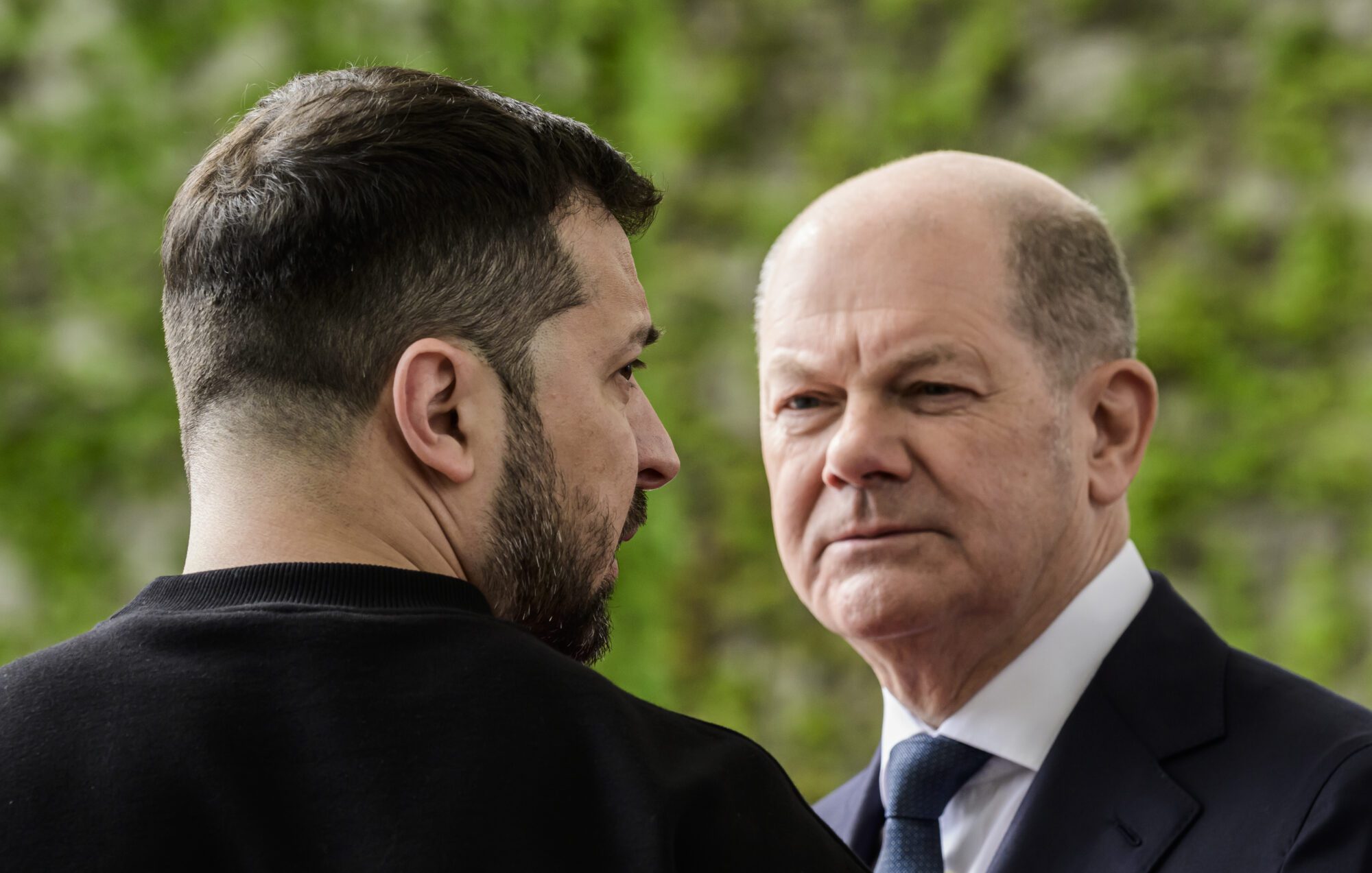
German Chancellor Olaf Scholz greets Ukraine’s President Volodymyr Zelensky during an official welcome ceremony on May 14th, 2023 at the Chancellery in Berlin.
JOHN MACDOUGALL / AFP
One day after having met with Italian Prime Minister Giorgia Meloni and Pope Francis in Rome, Ukrainian President Volodymyr Zelensky—personally and on behalf of the people of Ukraine—was in Germany to accept the Charlemagne Prize.
Named after the “Father of Europe,” Frankish King Charlemagne, who later went on to become emperor of the Holy Roman Empire, it is the oldest prize awarded for work done in the service of European unification.
While it had been awarded earlier this year, it had not yet been formally presented to the recipient.
Congratulations to @ZelenskyyUa and the People of Ukraine for being awarded the International Charlemagne Prize Award 2023. #karlspreis2023 pic.twitter.com/TJ5t6GrE27
— Karlspreis (@KarlspreisAC) May 14, 2023
German President Frank-Walter Steinmeier, Chancellor Olaf Scholz, and European Commission President Ursula von der Leyen were present at the Sunday, May 14th award ceremony, which, as is custom, took place in Aachen, near the Belgian border.
In a speech honoring Zelensky and Ukraine, von der Leyen said they were “fighting for the values and the obligation that this prize embodies.”
“In doing so,” she stated theatrically, “they are also fighting for our [Europe’s] own freedom and our values: democracy and the rule of law, free speech and the freedom to create your own destiny.”
After the awards ceremony, Zelensky lauded the Ukrainian people and its soldiers. “Ukrainians will always make Europe stronger,” he remarked.
Earlier that day, in Berlin, Zelensky met with German President Frank-Walter Steinmeier and Chancellor Olaf Scholz. The occasion marked the first time since the start of the Russo-Ukrainian war that the Ukrainian leader visited Germany.
Although Scholz and Zelensky had met several times before, their latest meeting marks the first on German soil since the advent of the war in February last year.
Zelensky’s noticeable postponement of meeting the head of the EU’s strongest member state has been interpreted as an act of disapproval. For a good while, Germany appeared half-hearted in joining other member states’ drive to supply Ukraine with arms.
This wait-and-see attitude that Berlin had adopted—or so it had communicated in the past—was the Chancellor’s way to avoid further escalation should NATO get overly involved. In January, Germany’s resistance broke when it agreed to send some of its Leopard tanks.
During a joint press conference at his official residence, Scholz attributed the delay in Berlin’s decision-making to Germany’s “slightly different system.” He maintained that Germany’s support for Ukraine was “stable and permanent.”
Despite Scholz’s avowed support of Ukraine, the German populace is less than united on the matter, as a recent survey indicated: 45% approve of the military support to Ukraine delivered by the West so far, 28% are calling for a stronger engagement while 22% desire less.
That Germany had found its second gear proved apparent on Saturday, May 13th, when Berlin announced a new military aid package worth €2.7 billion, its largest yet.
The Ukrainian government, which is securing as many arms as possible from its Western backers as it prepares for its counteroffensive, welcomed the decision.
On Twitter, Zelensky thanked Germany, whose “air defense systems, artillery, tanks and infantry fighting vehicles” would be “saving Ukrainian lives and bringing us closer to victory.”
I thank Germany for the largest military aid package since the beginning of the full-scale Russian invasion.
— Володимир Зеленський (@ZelenskyyUa) May 14, 2023
German air defense systems, artillery, tanks and infantry fighting vehicles are saving Ukrainian lives and bringing us closer to victory.
Germany is a reliable ally!…
Exactly when the 30 Leopard 1 tanks, 15 Gepard anti-aircraft tanks, over 200 reconnaissance drones, and four Iris-T anti-aircraft systems would be shipped to Ukraine has not yet been confirmed.
For Zelensky, this is still not enough. While the new package comprises the kind of arms Germany had supplied previously, fighter jets—high on Kyiv’s wish list—are not among them.
During their press conference, the Ukrainian president stated that he had asked his counterpart to join his “fighter jet coalition,” so that Ukraine could integrate modern fighter jets into its forces.
Scholz remained non-committal, noting that Germany had already supplied many weapons to Ukraine with the promise to continue doing so.
On Sunday evening, the Ukrainian president traveled to the Élysée Palace in Paris where he was welcomed by French President Emmanuel Macron, himself the 2018 recipient of the Charlemagne Prize.
Over a work dinner, the two would be discussing, among other things, France’s “military and humanitarian support” to Ukraine, the Elysée Palace reported.
